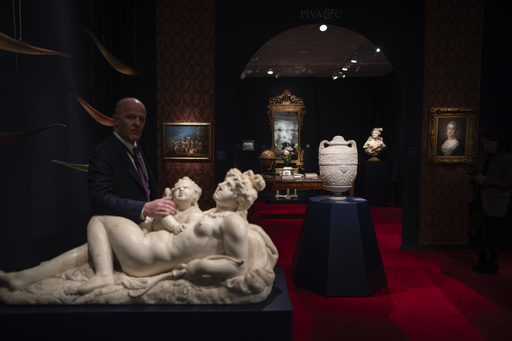MAASTRICHT, Netherlands (AP) — Old Masters, Roman statues, modern furniture, tribal masks and vintage watches are vying for the attention of well-heeled collectors as the TEFAF art fair opened on Thursday in the southern Netherlands.
The show takes place in a cavernous exhibition center transformed in just over a week of frantic work into a mega-gallery. Its eclectic collection looks and feels like a mashup of Amsterdam’s Rijksmuseum, New York’s Museum of Modern Art and the British Museum.
“Special about TEFAF is that we cover almost 7,000 years of art history, 7,000 years of human creation. Whether these are living or dead, artists or artisans,” said Hidde van Seggelen, an art dealer and chairman of the TEFAF executive board.
“Everything that you see here is made by by a human hand. It is all about creation,” he said.
The exhibit is also a showcase of the resilience of the art market in times of global uncertainty.
“We live in difficult times,” Van Seggelen said. “There’s a war … on the European continent, there’s a war happening in the Middle East and you hear about inflation in all countries across the globe.”
“And the art market is still very strong.” he added.
The Rijksmuseum did not waste any time in snapping up a painting by female artist Gesina ter Borch, a member of one of the Netherlands’ most important artistic families of the 17th century. The museum announced the new purchase shortly after the TEFAF doors opened in the city of Maastricht.
One of the highlights of the show, which runs through March 14, is an early portrait by Dutch master Vincent van Gogh, titled “Head of a Peasant Woman in a White Headdress.” It’s on sale at the stand of New Orleans gallery M.S. Rau.
The 1884 oil on canvas mounted on a panel dates to the time the young and unknown artist was living with his parents in the small rural town of Nuenen.
The woman’s identity is not known, but her image is a clear step toward one of Van Gogh’s masterpieces, “The Potato Eaters,” that was completed a year later.
It can be yours for 4.5 million euros ($4.9 million).
“I think art has been an extraordinarily good investment and even in uncertain times, it’s always it’s always held its own,” said gallery president Bill Rau.
“It’s an asset class and what we can be a better asset class than a Van Gogh?” he added, adding that, to him, the works are much more than just an asset.
“All these are my children,” he said as his daughter, Rebecca, walked past.
The fair, now in its 37th year, lets visitors admire and buy, if they have deep pockets, works ranging from a Roman urn dating back to around the 1st century, to a sculptural black wooden chair from 1990 by Italian designer Paolo Pallucco, one of 100 chairs he designed in a single night.
The European Fine Art Foundation, now known by its acronym TEFAF, was born out of a merger of two other art fairs — Pictura and Antiquairs International, which specialized in paintings and antiques.
The first TEFAF fair dates back to 1988, when 97 exhibitors took part. This year, there are 270 dealers and galleries from 22 countries.
The show offers certainty, Van Seggelen said. For buyers it has a strict vetting procedure checking provenance of works to ensure they get exactly what they pay for. For dealers, it offers a guarantee of private and institutional buyers travelling from around the world looking to beef up their collections.
But not everybody brings a checkbook. Two years ago, the fair was rocked by a brazen armed robbery, when thieves made off with diamond jewelry reportedly worth millions. Police said last year that they suspect the robbers came from the Balkans. Despite a 500,000 euro reward being offered for information, no arrests have been made.
“It was an extremely violent event, shocking for many of my colleagues, but exceptional,” said Van Seggelen.
All visitors pass through airport-style metal detectors and security guards with sniffer dogs walked around the conference center.
Van Seggelen declined to go into detail about security at the fair, but said: “It’s very strong and I feel very safe also for the visitors to come here.”
The items on sale don’t all have eye-watering price tags.
“I’ve seen items that you can buy for for a few hundred euros (dollars) … and I’ve seen items that are, you know, over 10 million,” said Van Seggelen.



